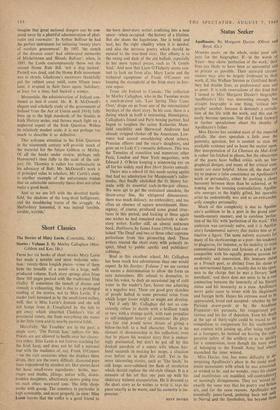Short Classics
The Stories of Mary Lavin. (Constable, 30s.) Stories : Volume 2. By Morley Callaghan (Mac- Gibbon and Kee, 18s.) FROM her six books of short stories Mary Lavin has made a notable and most welcome selec- tion: twenty-three longish pieces—some of them have the breadth of a novel—in a large, well- produced volume. Each story springs alive from these 360 pages packed with the traditional Irish vitality. If sometimes the tumult of drama and comedy is exhausting, that is due to a prolonged reading of the stories, not to Miss Lavin; if a reader feels hemmed in by the small-town milieu, well, that is Miss Lavin's domain and she will not budge from it. Unagitated by the itch to get away which unsettled Chekhov's trio of provincial sisters, she finds everything she wants in her little town and its nearby pastoral folds.
Mercifully, 'the Troubles' are in the past; a single story, 'The Patriot Son,' suffices for this. Priests are not allowed to beetle over her charac- ters either. Miss Lavin is not forever reaching for the Irish harp, and does not let fall a national tear with the readiness of, say, Frank O'Connor - -on the rare occasions when she displays these drops, they are the more difficult, diamond-pure tears engendered by stateless art. Her stories have the basic small-town ingredients: births, mar- riages and deaths, jiltings, unfair wills, down- trodden daughters, affectionate sisters going sour on each other, wayward sons. The little shops seethe with gossip. The cemetery in particular is kept constantly, and most properly, in view; Miss Lavin knows that the coffin is a good friend to the born short-story writer, confining into a neat space--when occupied —the history of a lifetime. But she shuns the lugubrious. She is brisk and taut, has the right ribaldry when it is needed, and also the intrinsic poetry which should be natural to the true-bred story. Her affinity is to the swing and dash of the old ballads, especially in her most typical pieces, such as 'A Gentle Soul.' And now that Liam O'Flaherty seems con- tent to look on from afar, Mary Lavin and the technical equipment of Frank O'Connor are keeping the stronghold of the Irish story in first- rate repair.
From old Ireland to Canada. The collection by Morley Callaghan, who in the Twenties wrote a much-praised tale, 'Last Spring They Came Over,' drops on us from one of the international heydays of the short story. In his case, there is a dating which in itself is interesting. Hemingway, Callaghan's friend and Paris boxing partner, had begun to toughen the satiny Katherine Mans- field sensibility and Sherwood Anderson had already stripped clothes off the Americans. Law- rence had ceased smouldering about miners, Prussian officers and the vicar's daughters, and gone on to Lady C's romantic defiances. This was the Twenties of transition and numerous other Paris, London and New York magazines, with Edward J. O'Brien keeping a winnowing eye on all for his widely read Best Short Stories annuals.
Theirs was a school (if this needs saying again) that had no admiration for Maupassant's tailor- mades, that finally abolished the 0. Henry for- mula with its essential sock-in-the-jaw climax. We were apt to get the restrained anecdote, the throw-away line, the whispered denouement; there was much delicacy, no embroidery, and too often an absence of square nourishment. Hem- ingway, of course, produced some grand struc- tures in this period, and looking at these again one wishes he had remained exclusively a short- story writer. Earlier still, an almost unknown book, Dubliners, by James Joyce (1914), had con- tained The Dead' and two or three other supreme perfections from this pioneering shed. These writers treated the short story with princely re- spect, blind to public apathy and publishers' sobbings.
Bred in this excellent school, Mr. Callaghan has been much less adventurous than one would expect. In his Stories : ,Volume 2 we see carried to excess a determination to allow the form an easy naturalness. His refusal to dramatise, to raise his voice, to dash an occasional jug of cold water in the reader's face, leaves one admiring in a negative way. These are good grey sketches of people halted in some personal crisis from which larger issues might or might not develop.
Yet if only Mr. Callaghan did not so con- sistently refuse to dazzle with a brilliant touch or two, with a strange quirk, with rank prejudice or self-indulgent luxury of invention! He plays too fair and would never dream of giving a below-the-belt to a bad character. There is no element of showmanship in this collection; even that he places his weakest story first is endear- ingly puritanical, but don't be put off by this docked anecdote of a sunny wife whose hus- band succeeds in making her mope, a situation ever before us in drab life itself. Yet in the more interesting stories, such as 'The Snob,' he still keeps over-subdued the flash of revelation which should replace the old-style climax. It is a measure of his art that one puts up with his obduracy without exasperation. He is devoted to the short story as he wishes to write it, says his piece exactly as he wants, and his austerity is im- pressive.
RHYS DAVIES






























 Previous page
Previous page